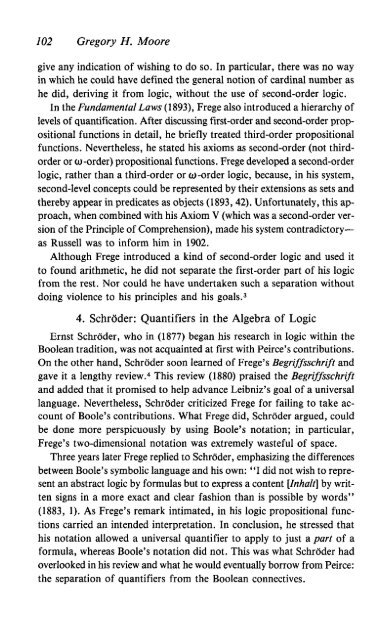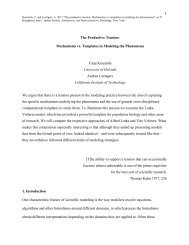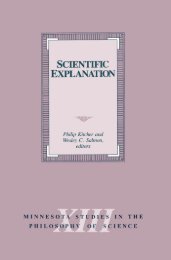The Emergence of First-Order Logic
The Emergence of First-Order Logic
The Emergence of First-Order Logic
Create successful ePaper yourself
Turn your PDF publications into a flip-book with our unique Google optimized e-Paper software.
102 Gregory H. Moore<br />
give any indication <strong>of</strong> wishing to do so. In particular, there was no way<br />
in which he could have defined the general notion <strong>of</strong> cardinal number as<br />
he did, deriving it from logic, without the use <strong>of</strong> second-order logic.<br />
In the Fundamental Laws (1893), Frege also introduced a hierarchy <strong>of</strong><br />
levels <strong>of</strong> quantification. After discussing first-order and second-order propositional<br />
functions in detail, he briefly treated third-order prepositional<br />
functions. Nevertheless, he stated his axioms as second-order (not thirdorder<br />
or (i)-order) prepositional functions. Frege developed a second-order<br />
logic, rather than a third-order or (0-order logic, because, in his system,<br />
second-level concepts could be represented by their extensions as sets and<br />
thereby appear in predicates as objects (1893, 42). Unfortunately, this approach,<br />
when combined with his Axiom V (which was a second-order version<br />
<strong>of</strong> the Principle <strong>of</strong> Comprehension), made his system contradictory—<br />
as Russell was to inform him in 1902.<br />
Although Frege introduced a kind <strong>of</strong> second-order logic and used it<br />
to found arithmetic, he did not separate the first-order part <strong>of</strong> his logic<br />
from the rest. Nor could he have undertaken such a separation without<br />
doing violence to his principles and his goals. 3<br />
4. Schroder: Quantifiers in the Algebra <strong>of</strong> <strong>Logic</strong><br />
Ernst Schroder, who in (1877) began his research in logic within the<br />
Boolean tradition, was not acquainted at first with Peirce's contributions.<br />
On the other hand, Schroder soon learned <strong>of</strong> Frege's Begriffsschrift and<br />
gave it a lengthy review.4 This review (1880) praised the Begriffsschrift<br />
and added that it promised to help advance Leibniz's goal <strong>of</strong> a universal<br />
language. Nevertheless, Schroder criticized Frege for failing to take account<br />
<strong>of</strong> Boole's contributions. What Frege did, Schroder argued, could<br />
be done more perspicuously by using Boole's notation; in particular,<br />
Frege's two-dimensional notation was extremely wasteful <strong>of</strong> space.<br />
Three years later Frege replied to Schroder, emphasizing the differences<br />
between Boole's symbolic language and his own: "I did not wish to represent<br />
an abstract logic by formulas but to express a content [Inhalt] by written<br />
signs in a more exact and clear fashion than is possible by words"<br />
(1883, 1). As Frege's remark intimated, in his logic prepositional functions<br />
carried an intended interpretation. In conclusion, he stressed that<br />
his notation allowed a universal quantifier to apply to just a part <strong>of</strong> a<br />
formula, whereas Boole's notation did not. This was what Schroder had<br />
overlooked in his review and what he would eventually borrow from Peirce:<br />
the separation <strong>of</strong> quantifiers from the Boolean connectives.




